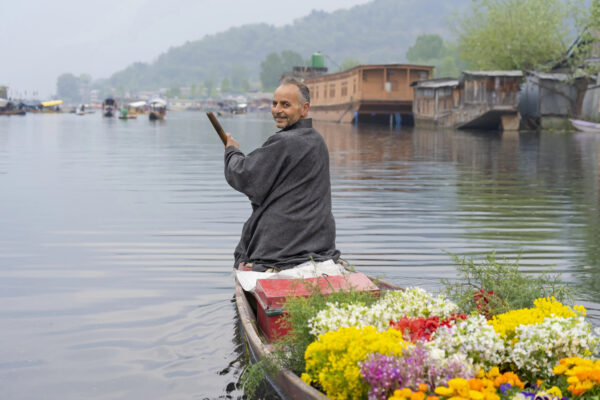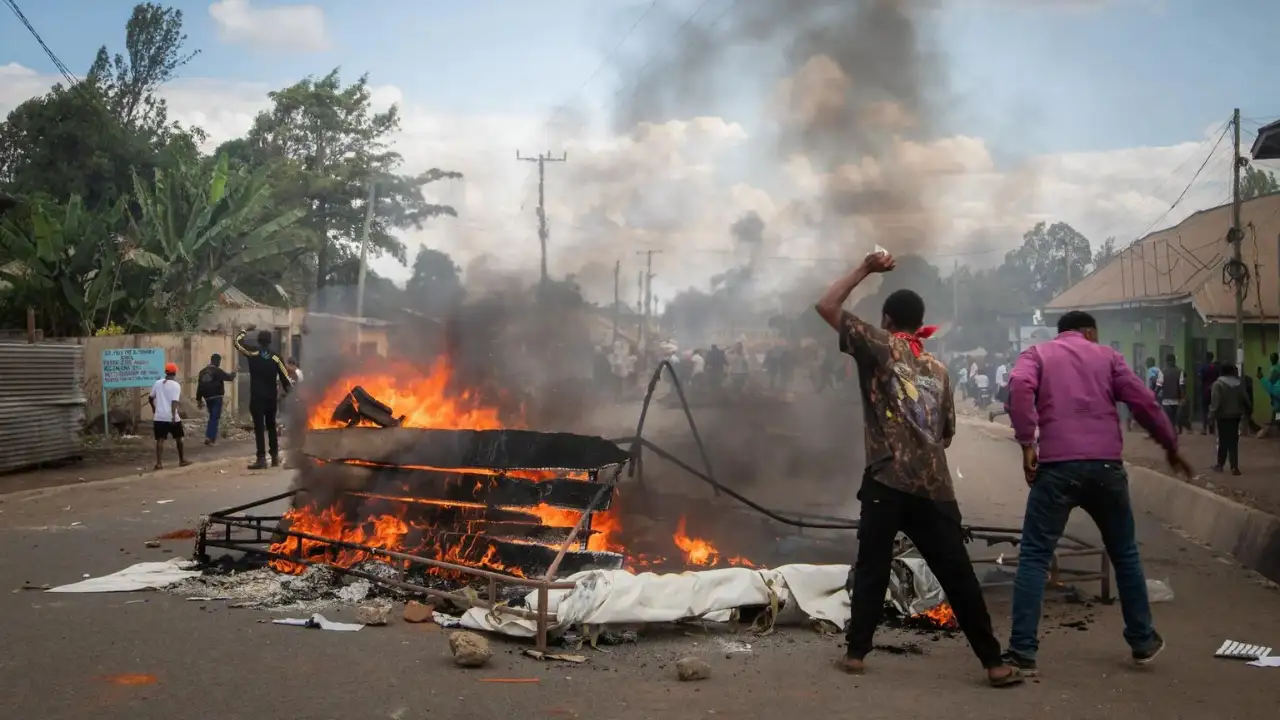Copyright thediplomat

In the half-lit room of his Srinagar home, Wamiq sits among half-packed suitcases and the hum of an anxious evening. His mother folds his shirts slowly, smoothing each crease as if trying to delay time. Outside, the call for Maghrib (evening) prayer drifts through the narrow lanes; soft, heavy, and familiar. Next week, the 26-year-old civil engineer will leave Kashmir for Dubai. His visa has finally arrived after months of waiting, months of doubt. “I thought I’d design bridges here,” he says, running fingers through his hair. “Now I’m crossing one I never wanted to.” He smiles, but it doesn’t reach his eyes. For many like Wamiq, the dream of home has grown smaller. Across Kashmir, educated youth are leaving not in fear of violence anymore, but in fear of stillness. They are escaping the slow suffocation of unemployment, dwindling opportunities, and the long shadow of political uncertainty. A Broken Economy Migration has long shaped Kashmir’s story. When the anti-India militancy erupted in 1990 and India sought to crush it with an iron hand, violence roiled the Kashmir valley. Thousands fled the bullets and blackouts. Although the militancy subsided somewhat in the following decades, fear and tensions never went away. Uncertainty ran high, deterring tourists from visiting. In the absence of investment, industry failed to develop and jobs were few. Then in August 2019, the Indian government revoked Jammu and Kashmir (J&K)’s autonomy, split the state into two entities – Jammu and Kashmir, and Ladakh – and brought these under direct central rule. Prime Minister Narendra Modi’s government sought to justify these controversial moves by claiming that with J&K’s full integration into the Indian Union, ambiguity in its status would end, paving the way for investment to flow into J&K, the government argued. Six years on, the promises feel distant, like echoes from another time. Investor summits came and went with banners of hope, but beyond the photographs and press releases, little changed on the ground. Private investment trickled in, far from the waves that were promised. Recruitment lists opened and closed with no results, leaving thousands waiting in silence. In the narrow workshops of Srinagar and the quiet bazaars of Anantnag, young artisans continue to carve wood and weave shawls, earning less than they did years ago. Tourism, once the valley’s heartbeat, now pulses at the mercy of headlines and curfews. According to the Forum for Human Rights in Jammu and Kashmir, the per capita growth rate of the Net State Domestic Product was 12.31 percent between April 2015 and March 2019. This dropped to 8.41 percent in the April 2019-March 2024 period. For many young graduates, the dream of a stable job feels like folklore — spoken of, but rarely seen. Today, Kashmiri youth are fleeing stagnation. Over 370,000 unemployed youth registered on J&K’s employment portal as of January 2025, one of the highest figures in recent years. The numbers lay bare an economy that produces graduates faster than it creates jobs, offering degrees without direction. A 2024 report by the Jammu and Kashmir Policy Institute, a Srinagar-based public policy think tank, noted how a weak private sector and prolonged bureaucratic hiring freezes have drained the region’s professional class. “Our best minds are leaving,” the report said, “and with them, our future capacity to rebuild.” This wave of migration is quieter than those before it — but more permanent. It is made up of people who once swore they would never leave, now learning the art of departure. Prosperity Without Peace In Anantnag district of the Kashmir valley, electrical engineer Musaib Rashid, 28, once dreamed of lighting Kashmir with his designs, but he left for Dubai in 2022, trading his stack of job applications for a two-year contract. Two years later, his income is steady, his apartment spotless, but his heart unsettled. “When I hear someone speaking in Kashmiri in the market, I stop,” he says. “It feels like a door opening — then closing just as fast.” Every month, he sends money home. His father renovated the kitchen. His sister enrolled in college. Yet every money transfer feels like a reminder of distance. On video calls, his mother asks, “When will you visit?” He answers, soon — though he knows he might not. Dubai has given him stability, but taken away belonging. “You earn well here,” he says, “but you live like you’re waiting for a return ticket that never comes.” Musaib is not alone in his struggle. Across Kashmir, many young professionals — engineers, doctors, teachers, and thinkers — face the same tension between dreams and reality. The hope of growth and recognition often falters against slow bureaucracies, frozen job openings, and an economy that cannot fully support new talent. For most, leaving isn’t just ambition; it’s survival. Choosing a steady income abroad often comes at the cost of leaving their aspirations, families, and a sense of belonging behind. This quiet exodus touches every sector, from healthcare to education, leaving both the people and their homeland feeling the weight of what’s been lost. Zainab: Healing Others, Losing Herself Dr. Zainab Hassan, 26, from Budgam district of Kashmir valley, once dreamed of serving Kashmir’s fragile healthcare system. But she soon realized that “vacancy doesn’t mean opportunity. It means waiting. It means uncertainty.” According to Kashmir Life, nearly 16,000 posts in Jammu and Kashmir’s health department remain vacant, frozen by recruitment delays, budget freezes, and bureaucratic limbo. Young doctors face months of unpaid wages and years of waiting for permanent positions. After years of searching for work, Zainab accepted a hospital offer in Manchester in 2023. “I wanted to heal people back home,” she says during a late-night call. “Now I fix broken bones, but I can’t fix the feeling of not belonging.” The snow outside her apartment window in Manchester looks familiar, but, she says softly, “it doesn’t smell like Kashmir’s winter.” Back home, her parents tell relatives she’s settled abroad. Zainab doesn’t feel settled at all. Shakir: The Reporter Who Lost His Beat Shakir Hussain, 30, once reported from South Kashmir’s flashpoints — chasing stories through curfews and chaos. By 2024, after years of shrinking press freedom and months without pay, he left for Bangalore in southern India. Now he edits digital stories for a start-up — a comfortable job in a comfortable city. Yet the comfort unnerves him. “I used to wake to gunfire or deadlines,” he says. “Now I wake to silence.” He writes occasionally about Kashmir, but his words, he admits, feel disembodied. “Sometimes,” he says, “I think I didn’t just change cities. I changed meanings.” Junaid: A Philosopher in Exile In Kulgam, Junaid Ahmad, 28, once spent his evenings reading books under the dim light of his father’s shop. He studied philosophy at the University of Kashmir but found no place to apply it — neither in classrooms nor in conversations. After graduation, he spent months searching for work — writing to colleges, coaching centers, even local NGOs — but philosophy, he discovered, had no market. “There was simply no place for philosophy in a place that runs on survival,” he says. “When everyone around you is just trying to survive, thinking too much feels like a waste of time.” In 2024, Junaid left for Ireland to pursue a master’s in philosophy, not chasing success but escaping stillness. “I didn’t leave to grow,” he says. “I left because I saw no future for thought here.” Now, in Dublin’s quiet cafés, he watches people chase dreams he doesn’t share. “Everyone here talks about finding themselves,” he says. “I’m still trying not to lose where I came from.” Sometimes, walking along the Liffey River, he remembers his mother’s voice echoing from the kitchen back home. “Belonging,” he says, “is not about where you live, it’s about where you’re remembered.” A Valley in Transit What unites Wamiq, Musaib, Zainab, Shakir, and Junaid isn’t merely departure, it’s disillusionment. They are the children of a generation that believed education would bring dignity. Instead, they inherit contracts, delays, and a queue of job seekers that never ends. According to a 2023 report in Quint, a growing number of Kashmiri youth view migration as their only path to a “normal life.” The unavailability of preferred subjects in local colleges is the top reason prompting students to move out of the valley. The Journal of Migration Affairs calls it a “quiet protest” against structural hopelessness; a movement born not from ideology, but from exhaustion. Those who leave search for better lives. Those who stay live surrounded by absences, empty classrooms, unsold homes, and aging parents. Kashmir’s economy, already fragile, is losing its most vital resource: its youth. Between Hope and Heartache In his final week in Srinagar, Wamiq avoids talking about the flight. He spends evenings walking along the Jhelum, watching reflections of old houses ripple in the current. The river feels like time — steady, unstoppable. At home, his mother keeps refolding his clothes. His father, usually stern, grows unusually gentle. On the last night before he leaves, power goes out — as if the city itself wants to stay dark a little longer. “I used to think I’d build bridges here,” he says softly, looking out the window. “Now I just hope I don’t forget what the river sounds like.” Musaib texts him from Dubai: “Don’t worry, brother. It gets easier.” Wamiq reads the message and wonders — is that a promise or a warning? Each departure from Kashmir now echoes like a farewell without closure — quiet, inevitable, unfinished. Those who stay measure the loss in silence. Those who leave count it in miles and memories. And as more planes lift off from Srinagar, carrying more young hearts than luggage, the valley grows a little emptier, still breathtaking, still home, but slowly running out of those who can afford to dream within it.



